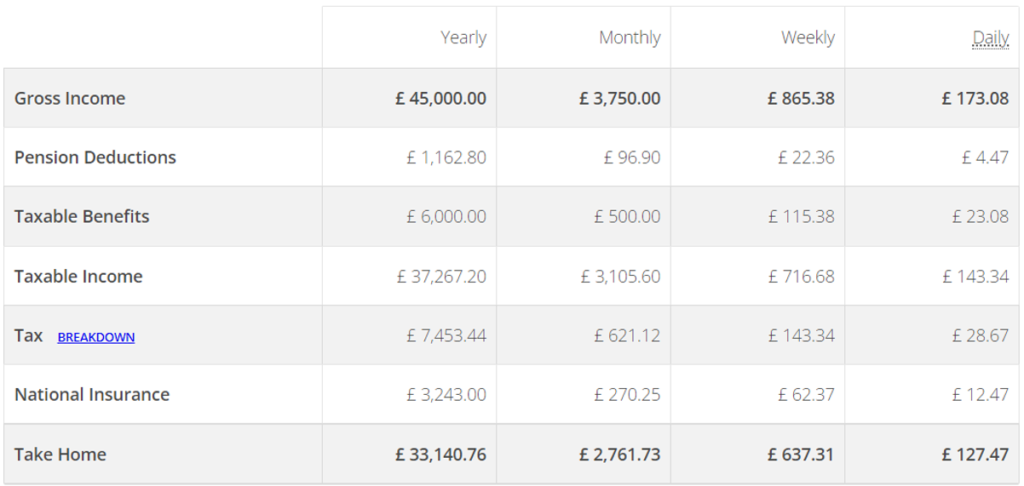Is the average salary in London enough to live well? If you want to live in London, you need to consider costs as well as how much you’d earn. Here, we help you calculate a true picture of a London lifestyle.
I worked in London for the best part of 20 years. It was, and still is, one of the most beautiful, vibrant cities in the world.
Its appeal as a place to live and work is not hard to understand. It offers a plethora of entertainment, activities, and work opportunities, all made easily accessible by a world-class transport system.
What should you be earning in London? What is a good salary, and how can you boost your earnings in the nation’s capital city? Let’s get all these questions answered and more.
TLDR: London Average Salary
If you’re wondering about life in London and if the average salary cuts it, here’s what you need to know in a couple of paragraphs!
London’s salaries are a mixed bag, with estimates of average salary ranging from £44,370 to £57,400 – way above the UK’s average. However, though this sounds attractive (and the lure of London as a vibrant city is undeniable) living costs are hefty too. Housing can be a wallet-drainer, tax will take its toll… and the cost of living might just make your eyes water.
But fear not, savvy budgeting and a keen eye on income-boosting opportunities mean you can relish all that London offers without breaking the bank. Because it’s not just about what you make, it’s about how you manage it, right?
What is the Average London Salary?
You’d think this was an easy question to answer, wouldn’t you? It’s not. There is a diverse range of estimates of average salaries in London. These include average median salaries of:
- £46,380 (ONS)
- £44,370 (Statista)
- £57,400 (Plumplot)
One thing that we can say for certain is that the average salary of London workers is far higher than the UK’s average salary.
For example, the ONS earnings statistics show that while the average salary in London is £46,380, move to Leeds and this falls to only £26,298. Across the UK, the average salary is £34,632 per year.
What’s a Good Salary in London?

I didn’t live in London, but was able to take advantage of the higher salaries available there by commuting. I’m not unique in this. More than a million people commute into the capital every day. No wonder my trains were delayed 90% of the time!
Even though I was earning good money, the cost of commuting (fuel, parking, and a season ticket) seemed often to make the extra earning power less than worth it.
Indeed, it wasn’t until I was earning £40k plus that my bank balance swung into the black. However, this is a different story – one for another day.
What you’re really interested in is how much is enough in London. Further, if you’re not earning enough to benefit from all that London has to offer, how can you ramp up your earnings?
Where Can You Earn the Most in London?
To understand earning power in London, you’ll need to first understand where you can earn the most money. Wages don’t collapse when you leave London. They step down, and in line with London Transport zones.
The highest earners work in Zone 1, with averages for selected areas as follows:
| Area | Average Salary |
| City of London | £87,500 |
| Westminster | £65,000 |
| Camden | £50,000 |
| Lambeth | £42,500 |
What Are the Highest-Paid Sectors in London?
The next factor to consider is the sector in which you work. At the bottom of the list is retail and hospitality. At the top, we find those working in high-tech jobs.
The high-tech range isn’t surprising – London is the UK’s tech hub, with billions in inward investment each year. Additionally, as the role of tech grows in all industries, the demand for IT talent is booming.
Here’s a breakdown of sectors and approximate average salaries earned in London for a variety of roles:
| Sector Role Average Salary | Role | Average Salary |
| IT | Data Architecture | £88,500 |
| IT | Software Engineer | £68,400 |
| Finance | Payroll Manager | £56,900 |
| Finance | Financial Analyst | £54,600 |
| Healthcare | Pharmacist | £48,800 |
| Healthcare | Nurses | £38,500 |
| Customer Service | Store Manager | £36,900 |
| Hospitality | Bar Staff | £33,200 |
| Hospitality | Waiting Staff | £30,700 |
| Customer Service | Customer Assistant | £27,423 |
What Are the Highest-Paid Professions in London?

Now, let’s move to the third critical factor – what your job title is.
London is one of the world’s top three financial hubs, and salaries within the sector reflect this. If you work in investment banking, fund management, or as a financial analyst, you’re in a great sector and a role with high earning potential.
I’ve already mentioned the importance of IT within the London landscape – and engineering managers are among the most handsomely rewarded professions in the capital’s economy.
Lawyers and surgeons are among the highest paid in London, too.
Within such professions, you could expect to earn an average of between around £75,000 and £110,000. Of course, the more seniority and responsibility you have, the higher your salary will be.
How Much Difference Does Education and Experience Make?
Other factors that affect pay include education and experience:
- The more highly educated you are, the higher your earning potential. According to Statista, the difference between average salaries for those with a doctorate and those with a master’s degree is an average of around £17,000 (c. £94,500 vs c.£78,000).
- With more than 20 years of relevant experience, you should expect to earn an average of around £103,000 vs an average of around £101,500 for 16 years’ experience.
How Much Does It Cost to Live in London?
Have the potential earnings achievable in London blown you away? If you currently live in Leeds, you might already be packing your bags to move south! But average salaries are not the only thing you’ll need to consider. If they were, there wouldn’t be so many Londoners living on the breadline.
Did you know that a higher proportion of Londoners are living in poverty than in the rest of the UK – 24% vs 19%? How can this be when potential wages are so much higher here?
Housing Costs Are Crippling
House prices are higher in London than anywhere else in the UK. According to Zoopla, the average sold prices for homes in London over the last 12 months were:

- Flats – £534,741
- Terraced Houses – £805,303
- Semi-Detached – £823,487
- Detached – £1,299,540
With rising interest rates, mortgage costs have ballooned. In April 2023, Rightmove reported that the typical repayment mortgage on a property with two bedrooms or fewer in London was £2,340 per month.
If you can’t afford to buy? Rental prices have risen by more than 14% in a year to almost £2,200 per month. A one-bed flat will set you back around £1,600 per month to rent.
Whichever way you look at it, housing costs will take a substantial chunk of your earnings.
Of course, you could decide to live in Greater London where rents are cheaper – but then you’ll have higher costs of commuting and the experience of extra time on crowded trains every day, and you won’t be near to where the real action is.
Living Costs Can Make You Livid
It’s not cheap to live in the glam and glitz of the capital. According to data compiled by numbeo.com, a beer will cost you more than £6 a pint (a price that I haven’t found to be expensive in the City).
On top of this, a public transport ticket will set you back more than £180. Food is more expensive than elsewhere in the UK, and you don’t want to hear the details of things like council tax and energy bills!
If you want to take your partner or spouse for dinner at a medium-priced restaurant, be prepared to spend £77.50 – before drinks!
Those occasional luxuries, like a sandwich for lunch and the occasional team drinks after work, also add up quickly.
And the Total Cost of Living in London is…
Totting up all the costs of living in London, the final cost-of-living figure is astounding. I hope you’re sitting down, and breathing deeply:
- For a single person, the average annual cost of living in London is £43,728
- For a family of four, the average cost of living in London is £68,400
Those high average salaries don’t seem quite so decent now, do they?
You may need a couple of minutes to recover!
How Can You Live in London Without Going Broke?
If you’re already living in London and struggling with the cost of living, or you’re considering moving to the capital but concerned about making ends meet, you’ll need to focus first on good financial habits.

You’ll be surprised how savvy budget planning can transform your finances. When you understand how you are spending your money, you can act to reduce your spending.
Doing this used to mean keeping meticulous notes of every penny spent in a cashbook. Then along came spreadsheets (of which I am a huge fan). These reduced the time taken and improved accuracy, but budgeting was still a chore. Today, budgeting is a breeze.
“How so?” you ask.
Well, budgeting apps like Emma or Plum, and digital banking apps like Monzo or Starling do all the heavy lifting for you. They capture your transactions, analyse spending, and provide automatic ways to save.
The result is that, combining your knowledge of the best budgeting techniques, embedding good financial habits, and utilising best-of-breed financial apps, you can afford to live in London on the average London wage.
BUT (and it’s a big but) you don’t want to simply live in London, do you? You want to enjoy all it has to offer. This means you’ll need to boost your income. Before we look at how you can do this, let’s take a quick look at the elephant in the room: tax.
Tax On London Salaries
The more you earn, the more you pay in tax. Those high-number average salaries I highlighted earlier in this article aren’t what they are cracked up to be when you deduct tax and national insurance:
- 20% on what you earn between your personal tax allowance and £50,271
- 40% on earnings from 350,271 and £150,000
- 45% on anything you earn above £150,000
Then, on top of tax and national insurance, you’ll need to allow for things like pension contributions and taxable benefits.
Fortunately, it’s not too difficult to calculate the impact of all the deductions from your salary. You don’t need to be a financial whiz kid or even know all the intricacies of our tax system.
You only need to know the numbers required, and plug them into the net salary calculator. The table below shows how the figures stack up for someone with:
- £45,000 gross income
- Pension contributions of 3% of salary into a workplace pension
- Taxable benefits of £500 per month

How Can You Improve Your Income in London?

It is possible to live in London on an average London income, or an even lower income, but you’ll enjoy life more fully if you can boost your income. Imagine if you could count yourself among the top 10% of households with an average disposable income of more than £70,000 a year.
Of course, more experience, higher educational qualifications, and choosing the right profession in the most vibrant sector are all ways to improve your income. However, gaining extra qualifications and experience naturally takes time – and what if you love your job and the employer you work for?
What other options do you have? As examples, you could:
· Accept a part-time job
You’ll gain more experience, and experience new work disciplines. You’ll also broaden and deepen your professional connections, which could prove very advantageous through your career.
· Start a side hustle
There are dozens of side hustle ideas you could choose from. That’s how I started my business – focusing on my core skills, learning new skills daily, and growing my network through client connections.
From pet-sitting and photography to online gigs such as blogging, tutoring, and selling on eBay, there is no limit to the options for earning – and it’s less like hard work if you do something that dovetails with your passion.
The Bottom Line – What’s a Good Salary in London?
Figuring out what makes a good salary in London isn’t as easy as it sounds. It depends on so many factors – including your personal circumstances and lifestyle. With such a high cost of living in London, what might be considered high earnings in another town or city could be some way short in London.
Considering all the factors that I’ve discussed in this article, a salary north of around £50,000 should be enough for a comfortable quality of life in the capital.
However, to decide just how much you need to earn, you’ll need to assess your current circumstances, your lifestyle goals, and your realistic earning potential.
Doing all of this, and ensuring you maintain healthy financial habits while utilising all the tools and techniques at your disposal, will help you earn to your full potential and enjoy an incredible life in our capital city.

